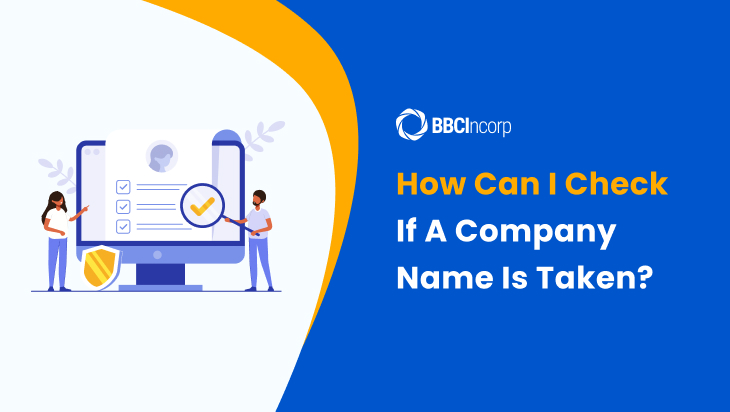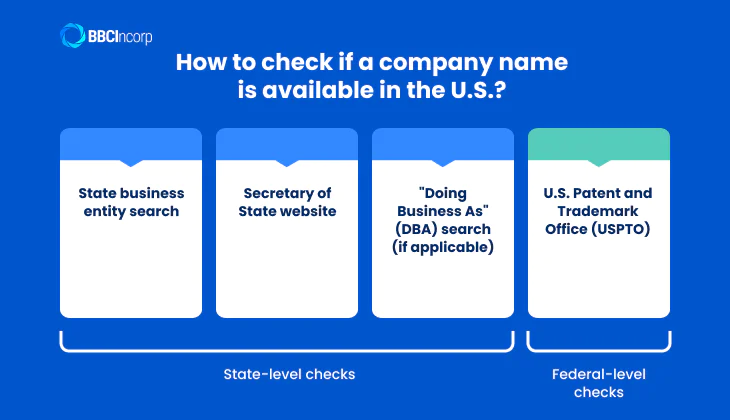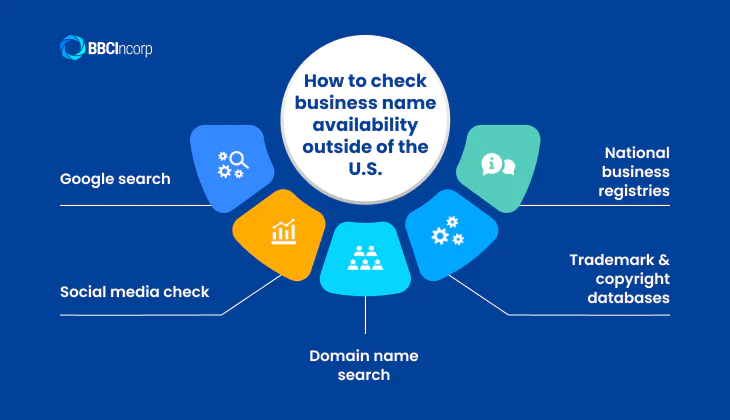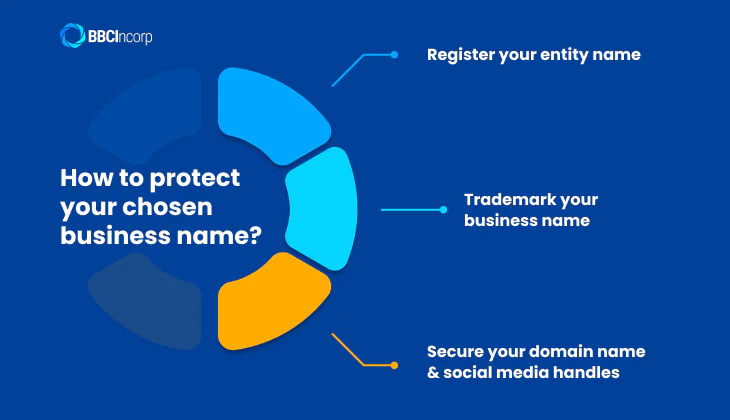
Table of Contents
Starting a business is an exciting journey, and one of the first steps is choosing the perfect company name. It reflects your brand identity and sets the tone for your entire venture. However, before you get too attached to that name, it’s crucial to ensure it’s available.
How can I check if a company name is taken? This is a key question for entrepreneurs. Using a name already in use can lead to legal disputes, branding confusion, or even financial setbacks.
In this article, we’ll walk you through a simple, step-by-step process to check if your desired company name is available. By following these guidelines, you can avoid costly mistakes and secure a unique name that truly represents your business vision. Let’s dive in!
Why checking business name availability matters?
When starting a new business, selecting a unique name is crucial. The right name helps establish your brand identity and ensures you avoid legal and financial challenges. Here’s why checking business name availability matters.
Legal compliance
State law requires businesses to have unique names. You can’t register a name that’s identical or even too similar to another existing business. For example, “Big Al’s Balloons” and “Big Al’s Balloon Supplies” would likely be deemed too similar.
Legal issues are costly and time-consuming. If your name infringes on another entity’s trademark, you could face a lawsuit, which could halt your business operations and result in financial loss.
Branding
A unique name is essential for distinguishing your business from competitors. If your name is too similar to another brand, it can cause confusion and make it difficult for customers to identify your business. A strong brand relies on clarity, and clarity begins with a name that sets you apart.
To create a standout name, focus on originality and relevance to your business. Ensure your name reflects your values, target market, and industry. A well-chosen name helps your business stay memorable, instantly linking your brand with the products or services you offer.
Risk of trademark infringement
Trademark infringement lawsuits cost U.S. companies billions every year. With over 3,000 cases annually, the risk is substantial. Beyond the legal costs, there are also rebranding costs to consider.
Rebranding due to trademark infringement means updating business cards, websites, social media handles, and more—expenses that could hurt your bottom line. It’s far easier and more cost-effective to check for name availability upfront.
By checking business name availability beforehand, you avoid unnecessary risks and ensure your business stands out with a unique, legally compliant identity.
How to check if a business name is available in the U.S.?
Before registering your business, you must check if your desired name is available to avoid legal conflicts and branding issues. In the U.S., this process involves both state and federal-level checks. Here’s how to verify your business name efficiently.
State-level checks
State business entity search
Each state has a dedicated business entity search tool that allows users to check for existing businesses registered within that state. Conducting this search ensures that the name you want is not already in use by another company.
This is crucial because states typically do not allow duplicate business names within the same legal structure. For example, if you are registering a Limited Liability Company (LLC) in Florida, you would use the Florida Division of Corporations website.
Secretary of State website
Each state has a Secretary of State (or a similar office) responsible for business registrations. To start your search, find the website for the state where you plan to operate and use their online business name search tool.
This tool allows you to check if the name you want is already registered by another business. Examples of state-specific search tools include:
- California: California Secretary of State Business Search
- Delaware: Delaware Division of Corporations Entity Search
- Texas: Texas Secretary of State SOSDirect
“Doing Business As” (DBA) search (if applicable)
If you plan to operate under a different name than your legal business name, you may need to file a Doing Business As (DBA) name. In some states, DBA names are registered at the county level rather than the state level.
To check availability, you can search county clerk websites where your business will be based. For instance, if your business is in Los Angeles, you would check the Los Angeles County Registrar-Recorder/County Clerk for DBA filings.
Federal-level checks
U.S. Patent and Trademark Office (USPTO)
Once you’ve conducted state-level checks, it’s time to verify your business name at the federal level. The U.S. Patent and Trademark Office (USPTO) plays a crucial role in trademark registration, which provides legal protection for your business name nationwide.
The USPTO offers an online search tool called Trademark Search tool, which allows you to search registered trademarks. By using this tool, you can determine if your desired business name is already trademarked.
A name that is trademarked by another business may limit your ability to use it, even if it is available at the state level. For example, if you want to name your company “BlueSky Tech,” and there is already a “BlueSky Technologies” trademarked under software services, you may need to adjust your name to avoid legal issues.
Make sure your business name is legally available before investing in branding and marketing. A thorough check at the state and federal levels, along with domain and social media availability, can save you from legal trouble and costly rebranding down the line.

How to check business name availability outside of the U.S.
If you plan to register a business outside the U.S., it’s essential to check business name availability through search engines, government registries, and trademark databases. Ensuring a unique name protects your brand and helps avoid legal conflicts.
Do a quick online searches
Google search
Start with a simple Google query. This step helps you lookup business name availability by entering terms like “[business name]” + “company”, “[business name]” + “register”, or “[business name]” + “location”.
If businesses with similar names appear, analyze their industry and region. If they operate in your sector or country, you may need to rethink your choice to avoid legal or branding conflicts.
Social media check
Many businesses establish a social media presence before formal registration. Search platforms like Facebook, Instagram, Twitter, and LinkedIn for existing businesses using your desired name.
Social media branding is crucial for visibility. If your preferred business name is already taken, consider slight modifications, such as adding a relevant keyword (e.g., “Summit Marketing” instead of “Summit”).
Domain name search
A matching domain name strengthens brand identity and credibility. Use domain registrars like GoDaddy, Namecheap, or Google Domains to check domain availability.
While securing a .com is ideal, consider using alternatives such as .net, .co, or country-specific extensions (e.g., .uk, .ca, .au). This also helps determine how to find if a business name is taken online.
Check official databases and registries
National business registries
Most countries maintain official name availability company databases to register business entities. These national registries let you verify if a business name is already in use.
For instance, if you’re planning to register a company name in the UK, you can use Companies House, the official registry. Other examples include:
- United Kingdom: Companies House
- Australia: Australian Securities and Investments Commission (ASIC)
- Canada: Canadian Business Registries
- European Union: European Business Register (EBR)
To check availability, visit the relevant registry’s website and enter your desired business name in the search bar. If the name is unavailable, you may need to modify it or check for alternative registrations in different business structures.
If an online search isn’t available, you can contact the registry by email or phone for assistance.
Trademark and copyright databases
A name might be available for registration but still protected by trademark law. To fully check business name availability, search trademark databases in the countries where you intend to operate. Key resources include:
- United Kingdom: UK Intellectual Property Office (UKIPO)
- Canada: Canadian Intellectual Property Office (CIPO)
- European Union: European Union Intellectual Property Office (EUIPO)
- Global Search: World Intellectual Property Organization (WIPO)
To check business name availability, visit the relevant trademark office for the country where you plan to operate. If an identical or similar name is trademarked in that jurisdiction, using it could result in legal disputes or forced rebranding.

What to do if your desired business name is taken
Finding out your preferred business name is already in use can be frustrating, but there are several ways to move forward. Instead of starting over, consider modifying the name, negotiating for rights, or selecting a new one.
Option 1: Modify your business name
If the exact name is unavailable, slight modifications can make it unique. Adding location identifiers like a city or state (e.g., “Summit Coffee Texas”) can differentiate your brand.
Another option is using descriptive words that clarify your business’s purpose, such as “Summit Outdoor Gear” instead of “Summit.” These changes keep your brand identity intact while ensuring business names available for registration.
Option 2: Purchase the existing name/trademark
When a name is essential to your brand, acquiring the rights might be an option. Start by checking WHOIS domain lookup, trademark databases, or Secretary of State records to find the current owner’s contact details.
Negotiations may involve purchasing the trademark or domain, though costs can vary significantly based on brand recognition and demand.
Option 3: Choose a different name
Exploring alternative names can lead to even better branding opportunities. Tools like business name generators (e.g., Namelix, Shopify) provide creative suggestions.
Once you find an available name, register it immediately to prevent others from claiming it. With a flexible approach, you’ll secure a strong and legally protected brand name.
How to protect your chosen business name?
Securing your business name goes beyond choosing one that’s available – it requires proactive legal and digital protection to safeguard your brand identity.

Register your entity name
Registering your business name with the state is the first formal step in protecting it. This is typically done when forming a legal entity such as an LLC or corporation through your state’s Secretary of State office.
Each state has its own registration process and fees. For example, in California, you must file Articles of Organization and perform a name availability check before submission.
Trademark your business name
For nationwide protection, apply for a federal trademark through the U.S. Patent and Trademark Office (USPTO). A trademark offers legal rights against infringement across all states.
Use the Trademark Search tool to confirm availability before applying. Once approved, a registered trademark strengthens your legal position and adds brand credibility.
Secure your domain name and social media handles
Online presence is critical for brand consistency. Secure your domain through registrars like GoDaddy or Namecheap, and claim matching usernames on major social platforms.
Doing so protects your brand from impersonators and helps customers find your business easily across the web.
Check availability of business name with BBCIncorp
Ensuring your business name is available is the first step toward building a secure and credible brand. BBCIncorp offers streamlined tools and services to make this process simple and efficient.
Use BBCIncorp business name checker
Our free business name checker allows you to instantly search for name availability across various jurisdictions. This tool is designed for ease of use and provides real-time results with no cost involved.
To begin, simply enter your proposed business name. The company name checker quickly scans for conflicts and helps you avoid common legal pitfalls before registration.
Engage our company formation service
For those moving forward with incorporation, BBCIncorp provides comprehensive company formation support. Our team ensures your business name is legally available and meets the requirements of your chosen country or state.
We handle the entire process—from name reservation to official registration—so you don’t have to navigate it alone.
Using BBCIncorp’s services means faster turnaround times, expert legal guidance, and a hassle-free experience. Whether you’re forming a U.S. LLC or expanding globally, our team supports your success from start to finish.
Secure your name and take the next step in building your business with confidence.
Conclusion
Checking business name availability is essential for building a strong, legally compliant brand. It helps avoid trademark conflicts, ensures adherence to state and national regulations, and creates a unique market identity. If you’re wondering how can I check if a company name is taken, this guide provides a clear and practical approach.
While finding the perfect name may take time, it’s crucial for standing out and ensuring legal protection. Ready to get started? Use BBCIncorp’s business name checker and company formation services to move forward with confidence and secure your ideal business name today.
Frequently Asked Questions
What happens if someone takes your business name?
If someone takes your business name, your first step is to determine whether you’ve trademarked it. A registered trademark provides strong protection, preventing others from using a similar name for similar goods or services. If you’ve registered your business, it can also help protect against competitors claiming the same name.
If another company claims your name, you must prove you were using it first. Documents such as records, product labels, or advertisements can serve as evidence. If the name is too similar, you could claim infringement, but it must be shown that customer confusion is likely.
In cases of infringement, you can send a cease-and-desist letter or pursue legal action, potentially resulting in a court order to stop the use of your name and compensation for damages. Consult an intellectual property lawyer to protect your rights effectively.
What are the penalties for trademark infringement?
Trademark infringement carries serious legal consequences aimed at protecting the rights of trademark owners. Penalties can include both financial and reputational damages.
Injunctions may be issued to stop the infringing party from further unlawful use of the trademark. These can be temporary or permanent, depending on the case’s resolution.
Monetary damages compensate the trademark owner for losses. These can include actual damages, profits of the infringer, and statutory damages, which may range from $1,000 to $200,000 per infringement.
In cases of willful infringement, enhanced damages may be awarded, potentially tripling the actual damages. Additionally, the prevailing party may recover attorney fees.
In severe cases, such as counterfeit goods, criminal charges may be filed, leading to substantial fines and imprisonment.
Disclaimer: While BBCIncorp strives to make the information on this website as timely and accurate as possible, the information itself is for reference purposes only. You should not substitute the information provided in this article for competent legal advice. Feel free to contact BBCIncorp’s customer services for advice on your specific cases.
Industry News & Insights
Get helpful tips and info from our newsletter!
Stay in the know and be empowered with our strategic how-tos, resources, and guidelines.





